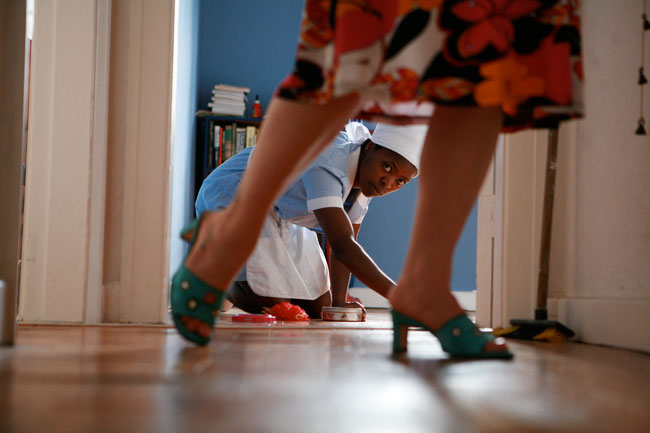Anybody can be a maid
All maids in South Africa are called Sheila. It’s the job description: to have a name that is directed at you but has nothing to do with you.

Zanele Muholi, "Massa and Minah 2," 2008
With two hundred rand in your pocket you can transform yourself into a maid. If you take your two hundred rand to your local Pick n’ Pay or Shoprite you can buy a maid’s uniform.
In the bad old days the uniform was in timid and unimaginative pastel and powdered colours – pink, yellow, blue, green. But, in the new dispensation companies with names like ‘Ethnix’ make maids’ uniforms that cover the cultural landscape of the adolescent South Africa. Indigos that imitate the traditional isishweshwe wink at you and declare their functionality. Geometries of shape and colour call to you in a Ndebele dialect that you may not speak.
When you open the package the smell of starch and cardboard signals the cleanliness that the maid is expected to preserve and uphold if only by keeping her uniform clean and ironed. What you soon discover is that the uniform is not just a practical coverall to protect the wearer’s clothes.
The uniform is a cultural and sartorial artefact – part throwback to some aristocratic age when all wealthy households had liveried servants and part mockery of African femininity. The aristocratic inheritance is in its definition as a uniform: for the maid to do her work she has to strip herself of all accessories and clothes that make her unique. She has to become nondescript, inconspicuous, non-threatening. For her to perform her duties, she has to be seen to be submitting to the discipline of sameness.
That’s why all maids are called Sheila. It’s the job description: to have a name that is directed at you but has nothing to do with you. The mockery hidden between the folds of the apron is not derision but a deceptive counterfeit. The maid’s uniform mocks African femininity by packaging an overall, apron and doek and presenting these as a set to be worn together: never the overall on its own or the doek on its own. It’s the togetherness, the inseparability that makes the uniform a deceptive counterfeit of the sartorial choices an African woman may make. The often colourful and mix-and-match doek becomes a monochrome square to be folded into a triangle and tied around the head. The apron places the maid in the kitchen where she cooks, chops, peels and scrubs with the implied confidence that the splatters will land on her apron. As with the doek, the apron may be hemmed by white frilling: another nod to the feminine nature of the work and uniform. Once she takes the uniform out of the packet, it may become her property and she may fold it neatly into her bag when she leaves work. Or, the uniform may remain with her employer neatly hanging in a broom cupboard or on a nail in the pantry or draped over the ironing board. It is her uniform; no one will ever wear it so she’ll always find it where she last left it.
And, if you need a script to go with the uniform then you can just read the cartoon Madam & Eve. Like with the purchasable uniform, the cartoon allows all who read it a voyeuristic journey into the domestic world of madams and their maids. The madam and her mother are tight-fisted ladies of leisure who are not willing to fall for Eve’s tricks. Eve, the maid, is inventive especially when it comes to shirking her work, and she is always looking for novel ways to ask her madam for a pay raise. Madam & Eve represents the unspoken question of post-apartheid South Africa. Why has the madam and maid relationship endured? Is it because South Africans are addicted to gleaming brass and sparkling windows? Or, is it that we are addicted to exploitation? The fact that the cartoon itself has continued to make South Africans laugh may point to a possible answer. The madam and maid relationship has been elevated, like other exploitative and oppressive institutions and conditions, to the status of chicness. Whether it’s shabby chic or shack chic, popular culture has found a vocabulary for comprehending and labelling a troubling human relationship. The appending of the language of style and aesthetics to deprivation and poverty has the effect of implying agency. In the same way that an interior decorator may intentionally choose distressed and coarse fabrics to create the look of antiquity, the availability and saleability of maid uniforms and cartoon characters lulls us into the belief that being a maid is a choice.
* Hlonipha Mokoena is the author of “Magema Fuze: The Making of a Kholwa Intellectual” (2010, University of Kwazulu-Natal Press). This piece first appeared in the Johannesburg exhibition “PASS-AGES: References & Footnotes.” It is published here with the permission of Mokoena and Gabi Ngcobo, curator of PASS-AGES. The images are from Zanele Muholi‘s 2008 project “Massa and Mina(h)”




















